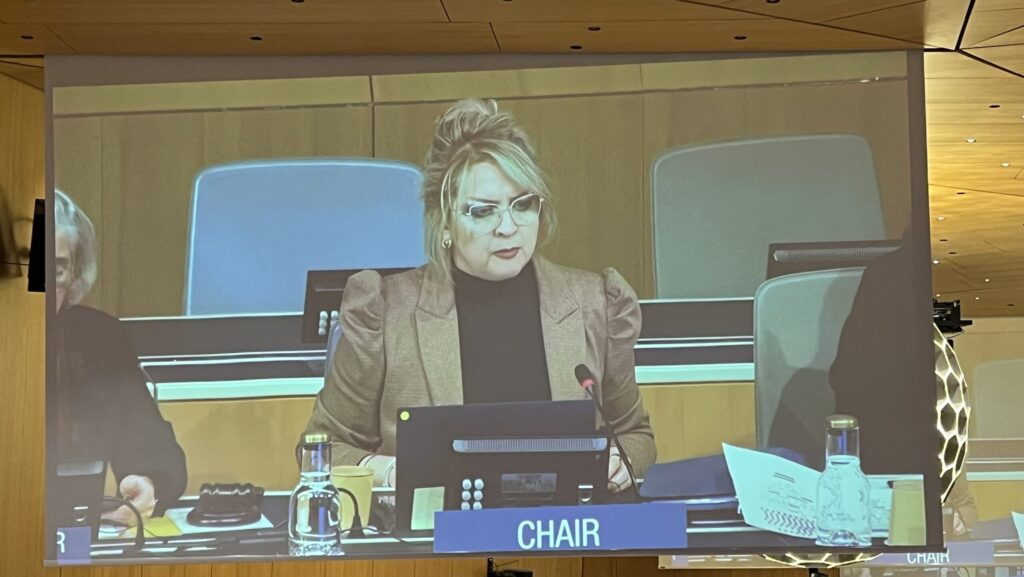For those looking for a refresher on what happened at SCCR 45, you can see our posts here, and the summary of the chair here. You can read our look ahead to this week here.
SCCR 46 opened with a new Chair, with Vanessa Cohen (Costa Rica) succeeding Adriana Moscoso (Spain, now the General Manager of GESAC). In the past the SCCR has had two Vice-Chairs although no second Vice-Chair seemed to be forthcoming this time around.
World events could be felt in the early exchanges as Ukraine, then the Central European and Baltic States (CEBS) Group, and Poland on behalf of a 33-strong group of countries, followed by Canada all took the floor to underline the damage of the war to Ukraine’s cultural and broader IP industries. The Russian Federation used its right of reply to lament the disrespectful wasting of time by delegations on topics irrelevant to the SCCR agenda.
Agenda item 3 on accrediting observers finally got underway but suffered a number of false stops (as opposed to false starts) as the number of approved observers satisfying the consensus based approach of SCCR fell from all of the six candidates, to 5 (Türkiye opposing the nomination of Eshkolot from Israel) and then 4 (Kenya opposing the nomination of Music Copyright Society of Kenya).
The other nominees were all approved which is a cause for celebration for IPA, as our Associate member the African Publishers Network (APNET) was one of them. Our congratulations to APNET. Their unique perspective on the topics in this forum will be valuable to all stakeholders.
Member States then delivered general comments on the week’s discussion topics, whereby many complemented their congratulations to the new chair with their commitments to building consensus and a preference for two meetings per year. There were murmurs of dissatisfaction from some groups that the Broadcasting Treaty, approaching 30 years of discussions, is still taking up so much time of the agenda, while many supported the ongoing work across all agenda items.
With the clock ticking, the discussions on the Broadcasting Treaty were opened for brief presentations of modifications to the draft Treaty text before breaking for lunch.
Lunch was the occasion for the first side event of the week Audiovisual Creativity and Enterprise – the role of Copyright as a key incentive. This was organised by the International Federation of Film Producers’ Associations (FIAPF). At the event Sata Cissokho, Head of Acquisitions at Paradise City Sales (Memento Films) and film producer Emily Morgan at Quiddity Films, delivered engaging presentations that gave a sense of the complextiy and equilibrium that brings a film from initial idea to an international audience. The cases studies included the films I am not a Witch, Supernova, Dreamers and The Ugly Stepsister. And the word that kept coming back again and again was risk, risk, risk.
IPA will hold its own side event on Thursday lunchtime entitled Who is writing? Rights and responsibilities in an AI-powered world, delivered by the well known AI expert Peter Schoppert from Singapore.
Back to the plenary chamber for a round of remarks from Regional Groups, Member States and a few observers on the progress (or not) around the Broadcasting Treaty before discussions were taken into informals (where Member States can discuss texts, and observers can listen in from the plenary chamber, but no reporting is allowed), where they may stay for much of Tuesday before the opening of discussions at the end of the day on Limitations and Exceptions.
Delegates would have to choose between the evening Geneva sun and the second side event of the week, Promoting AI for Good in the Global South organised by A2K Latin American Alliance, Fundación Vía Libre, which was held in the evening. We will report on that in tomorrow’s post.

